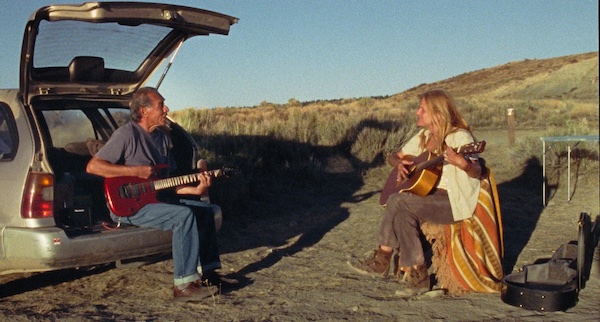Film Review: “A Love Song” — A Marvel of Humanity
By Gerald Peary
Max Walker-Silverman’s first feature, A Love Song, is a character-driven, humanist, and deeply ecological present to someone of my generation.
A Love Song, directed by Max Walker-Silverman. Screening at Kendall Square Cinema.

Wes Studi, left, with Dale Dickey in A Love Song. Photo: Bleecker Street
I’ve been old-man kvetching in Facebook posts lately about the astonishing incoherence of Jordan Peele’s Nope and the wearying, maximalist cutting of Everything Everywhere All at Once. Both films have been embraced enthusiastically by Marvel Movies-trained young audiences. What I see as faults they commend as happy virtues. Films with potholes in the screenplays and that crash about deliriously through time and space are, for kids today, high school and college, A-OK. But not for creaky me.
And neither for (a total anomaly!) Colorado filmmaker Max Walker-Silverman, whose values and approach to cinema are blessedly archaic. His first feature, A Love Song, is a present with a ribbon to someone of my generation. It’s consciously pensive, slow-moving, character-driven, humanist, and deeply ecological. And it’s principal characters, a woman named Faye (Dale Dickey) and a guy named Lito (Wes Studi), are slow-moving, past-their-prime adults. There is not a gun drawn in the whole film, not a moment of violence nor even a raised voice. And the one potential sex scene is cut off before any unbuttoning.
And old-timers take note and celebrate: A Love Song is shot on film. Not video. Film.
Walker-Silverman, self-described as a “cowhand, literary editor and community organizer,” grew up in Telluride before heading East, to NYU, for film school. He brought some of his NYU friends back to Colorado to make up his eight-person crew for A Love Song; and cast and crew filmed for one month in an extraordinary location in southwest Colorado, with a lake in front and mountains behind and stars in the sky. The locale allowed for heavenly shots of nature and for a concentration of all on A Love Song’s intentionally tiny story. This woman Faye has rented a spot, Campsite 7, and waits by her trailer for a boyfriend of her youth, Lito, to come visit her there. In the many years since their relationship, both had married, both partners had died.
Will Lito show up? As Faye patiently waits, a few other people enter and exit the scene: a group of young Mexicans wanting to do a burial, a postman who brings daily mail, and two African American lesbians who wonder if they should marry. That’s the whole cast. Spoiler alert: Lito does finally appear, and he and Faye sit about and reminisce; and whether they will get together again is unsaid in the air. More leaving and some sorrow, and there’s a dazzling night when Faye climbs up the mountain and looks for comfort at the galaxies shining above.
That’s it for the movie, and enough. I love these words from an interview with filmmaker-writer-editor Walker-Silverman: “I wrote this for the lake where I live; for the mountains where I grew up … all the different ways love can touch our lives, enter it, exit it, reenter it.” How many young people nurtured on the studio-manufactured Marvel Universe can find sustenance in this pantheist filmmaker’s pacifist credo? “I hope to keep writing gentle stories out in Colorado and making them with my friends.”
Gerald Peary is a Professor Emeritus at Suffolk University, Boston; ex-curator of the Boston University Cinematheque; and the general editor of the “Conversations with Filmmakers” series from the University Press of Mississippi. A critic for the late Boston Phoenix, he is the author of nine books on cinema; writer-director of the documentaries For the Love of Movies: The Story of American Film Criticism and Archie’s Betty; and a featured actor in the 2013 independent narrative Computer Chess. His latest feature documentary, The Rabbi Goes West, co-directed by Amy Geller, has played at film festivals around the world.

Well done Gerry.
I agree! Gerry at his best – a social worker for great art, big and small.
I am a 74 year old woman. It was by serendipity I chose to view A Love Song out of 100’s of films offered on cable. I was moved to hear the words uttered by the lead character, “however long you will have together – it will be long enough.”
My husband is dying of cancer.
Thank you Max.
Tessie (AZ)